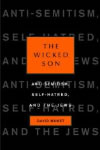The Wicked Son
An intriguing, incoherent book from a great writer. Mamet has long argued that anti-semitism is alive and vital -- not merely amongst the poor and ignorant but also -- perhaps especially -- among educated and sophisticated circles. His attack on Schindler's List ("It is to my mind Mandingo for Jews") strikes me as provocative and worthwhile: it might be right, it might be wrong, it is certainly worth hearing. His portrait of Jews in film, "The Jew For Export" (in Make-Believe Town: Essays and Remembrances) is essential. Here, his discussion of the real meaning of Santa Claus (and the real reason parents delay telling the kids the truth about Santa) is well worth the price of admission.
But this book, which tries to expose the wickedness of the "wicked son" of the Passover Haggadah, the son who asks "What does this mean to you?" , founders because Mamet cannot bring himself to sympathize, even distantly, with the son. Mamet tells us that the son is wicked because he is aggressively removing himself from the family, the community, the tribe, under cover of "simply" asking a question. And this might indeed be wicked if the son were removing himself because he believed he'd receive some benefit from electing himself out of the family, if the son dishonestly chose to pretend that he did not belong to this family even while feasting at the family table.
What Mamet affects not to understand -- what he doesn't even mention -- is that the wicked son need not be the sullen teenager trying to distance himself from the family he is trying to disown. He may instead be asking a pertinent question. "You say that you are doing these things to commemorate the intervention of The Eternal One in a labor dispute long ago and far away. This is patently improbable, and such evidence as we possess has clearly been contaminated by many generations of political tampering in support of causes and kingdoms long forgotten. We have known this in our family for generations: the only thing that anyone remembers of my great-great grandfather was that 'he was a learned man,' and his descendants read and studied and wrote. When you study Rosa Luxemburg or Abe Lincoln or Pericles, you apply different standards than you are applying tonight. What makes this night different from all other nights?"
